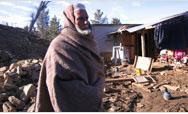You are here » Home » Telling Our Story
Case Study
Systematic business practices strengthen new enterprises
Villages Diversify Local Economies

| |
Photo: USAID/Suzanne Ross
|
|
Eight community groups from village clusters in Kampuan. Suk Samran district, received training and small loans to begin new businesses.
The village clusters of Kampuan, in Thailand’s southern Ranong region, are learning to diversify their economies and strengthen business practices.
|
Challenge
The impact of the December 2004 tsunami was especially harsh on coastal communities that lived off of specialized niche markets. Villages that were largely dependent on products made from cashew nuts, fish, fruit-trees, mangrove, water hyacinth or seaweed found themselves without the resources to continue their pre-tsunami occupations or the expertise to start working in a completely different sector. The tsunami had destroyed many of the natural resources they had come to depend on, and villages that were wholly dependent on, for example, seaweed for their livelihoods, were less resilient to the economic fallout than communities with more diversified economies.
Initiative
USAID stepped in to help some of these villages cope with the tsunami’s aftermath and rebuild more resilient economies. In Kampuan village, in Thailand’s southern Ranong region, most residents had some level of education but were unfamiliar with systematic business practices such as consumer buying assessments. USAID offered them training in small business development planning, and worked with the community to identify product areas with strong potential in the local market. By assessing local consumer behavior, the project identified eight products as essential to all villagers. Villagers agreed to form cooperative business groups to develop the eight selected products, and USAID established a revolving fund loan program that villagers could use for seed money to start their businesses.
Results
After identifying markets and receiving training, over 100 villagers developed business plans and were approved for small loans from the revolving fund. Loan recipients and revolving fund managers received intensive training about the fundamentals of financial management, including basic accounting, bookkeeping and loan repayment, as well as product development, quality control, packaging, distribution, and monitoring and evaluation of consumer satisfaction. With USAID’s help, communities are learning better practices and building more diversified business that will bolster their capacity to weather future environmental and economic shocks.
Print-friendly version of this page (398kb - PDF)
Click here for high-res photo
Back to Top ^ | 

